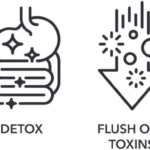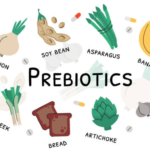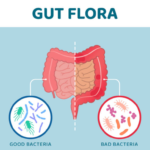
How to Manage Stress For Better Gut Health?
Imagine you’re juggling deadlines and feeling the world’s weight. In reality, stress is more than just a concept; it’s a battle many face. But have you ever thought about how stress affects your gut health? Personally, I’ve felt those stomach issues, too, initially not linking them to stress.
Indeed, research shows that stress damages our digestion. As a result, it can lead to gastrointestinal problems and upset our gut balance. Consequently, conditions like irritable bowel syndrome (IBS) and inflammatory bowel disease (IBD) can start this way. Therefore, knowing how stress impacts gut health is crucial for managing it.
The link between stress and gut problems can appear endless. However, I learned that managing stress-related digestive issues with lifestyle and diet changes is key. By doing so, we can better manage stress and bring our bodies back to balance, which ultimately enhances our overall health.
Key Takeaways
- Chronic stress can disrupt the gut microbiome by increasing harmful bacteria and reducing beneficial bacteria. Eating less processed foods and sleeping 7-8 hours a night positively impacts gut microbiota composition.
- Gastrointestinal issues like IBS are often made worse by stress.
- Managing stress through lifestyle changes can significantly improve gut health.
- Dietary adjustments, like eating more fermented and less processed foods, are essential for gut health.
- Sleeping helps overall and gut health.
Understanding Stress and Gut Health
The link between stress and gut health is complex. It involves the gut-brain axis, gut microbiota composition, and the sympathetic nervous system. Knowing these parts helps us understand how stress affects our digestion and overall wellness.
Understanding the Gut-Brain Connection
The gut-brain axis intricately connects the gut and the brain. This network uses the vagus nerve, hormones, and the immune system for communication. Notably, stress affects the gut, and the gut, in turn, influences stress, demonstrating the interdependence of these systems.
Interestingly, about 90% of serotonin and 50% of dopamine are made in the gut, highlighting its importance in our emotions and overall well-being. Moreover, short-chain fatty acids produced in the gut help create beneficial neurotransmitters and reduce brain inflammation.
Furthermore, constant gut inflammation can interfere with brain functions and emotions. Therefore, this emphasizes why maintaining a healthy gut-brain connection is key.
The Gut Microbiome Explained
The gut microbiota acts like an unseen organ. Indeed, it’s crucial for digestion and fighting off diseases. However, the mix of gut microbiota can change due to diet, the environment, and stress. In fact, studies have linked less diverse microbiota to depression. Interestingly, some individuals’ microbiomes make them better at handling stress.
Fortunately, eating fermented and fiber-rich foods, probiotics, and prebiotics can lower inflammation and boost gut health. Consequently, choosing a diet rich in veggies and gut-friendly foods can help people feel less stressed.
The Impact of the Sympathetic Nervous System
Stress triggers the sympathetic nervous system, impacting the gut. As a result, it can change how we digest food, leading to bloating, pain, and other symptoms. Over time, chronic stress alters the gut microbiota and can trigger immune reactions. Ultimately, this illustrates the complex link between stress and gut health.
Here’s a summary of the critical points in a table:
| Key Element | Impact | Study/Statistic |
|---|---|---|
| Gut-Brain Axis | Links gut health and emotional well-being through neurotransmitters like serotonin and dopamine | 90% of serotonin and 50% of dopamine are produced in the gut |
| Gut Microbiota Composition | Influences mental health, with dietary interventions improving stress resilience | Fermented foods reduce inflammation; diets rich in fiber improve gut health |
| Sympathetic Nervous System | Activates during stress, altering digestion and potentially causing gut inflammation | Chronic stress disturbs gut microbiota and initiates immune responses |
The Effects of Chronic Stress on the Digestive System
Chronic stress greatly troubles our digestive system. It can lead stress-induced gastrointestinal symptoms. During stress, our body focuses on fight or flight. This shift badly affects our gut functions.
Common Symptoms and Conditions
Prolonged stress messes with digestion. We may face indigestion, heartburn, nausea, and changes in bowel habits. For serious cases, therapies like relaxation techniques, yoga, or meditation can be beneficial. They teach the body to handle stress better. Also, stress can make irritable bowel syndrome (IBS) and inflammatory bowel disease (IBD) worse.
Exercising helps balance hormones and release endorphins. Breathing techniques also ease bloating and stomach pains. They trigger our relaxation mode. Consulting a doctor and maintaining a healthy diet are crucial for addressing these digestive issues.
Impact of Stress on the Gut Microbiota
Chronic stress changes our gut microbiota, the good and bad microorganisms living in our gut. It can lead to gut inflammation and reduced microbiota diversity. This imbalance makes digestive symptoms show up more and get worse.
For example, people with IBS feel worse under stress because of these changes. Adding probiotics and prebiotic foods can help. They boost good gut bacteria. Additionally, Cognitive Behavioral Therapy (CBT) can also assist in managing stress and its impact on gut health.
Below is a comparison table illustrating the effectiveness of various stress management techniques:
| Technique | Benefits | Examples |
|---|---|---|
| Exercise | Balances hormones, releases endorphins | Running, Yoga |
| Breathing Techniques | Engages relaxation response, reduces bloating | Deep Breathing, Meditation |
| Dietary Adjustments | Promotes healthy gut bacteria, regulates digestion | Balanced Diets, Probiotic Foods |
| CBT | Improves emotional regulation and gut health | Therapy Sessions |
Chronic stress affects our digestion in complex ways. I think it’s important to address it from multiple angles. Knowing how stress and gut health are linked can really improve your life.
Managing Stress for Gut Health
Managing stress is crucial for maintaining a healthy gut. Stress reduces gut movement and alters gut sensitivity, ultimately affecting overall health. However, by incorporating practices such as meditation, regular exercise, and sufficient sleep, you can manage stress more effectively.
Improving gut health requires a comprehensive approach. This includes seeking expert advice and adopting healthy lifestyle strategies. While genes play a minor role in determining gut bacteria, diet, medication, and body measurements explain 20% of the differences. Therefore, eating the right foods to support your gut is extremely important.
Moreover, studies indicate that social stress may alter gut bacteria and impact how your body responds to stress. This could lead to a leaky gut, increased inflammation, and changes in other health markers. In fact, long-term stress, such as ongoing marital issues, can exacerbate these problems. This further demonstrates how vital it is to manage stress effectively.
Additionally, the gut’s enteric nervous system contains over 100 million nerve cells, which communicate with the brain and immune systems. Thus, managing stress benefits not only your gut but also your overall health.
In conclusion, using stress-reducing techniques and making mindful daily choices are essential to mental and physical health. By prioritizing stress management, you can strengthen your gut’s resilience against stress, leading to a more balanced and healthier life.
How Diet Influences the Stress-Gut Relationship
Our diet plays a significant role in shaping our gut microbiome, which can, in turn, influence our stress levels. By incorporating certain foods into our daily meals, we promote the growth of beneficial bacteria. As a result, this supports our gut health and enhances our ability to manage stress.
Beneficial Foods for Gut Bacteria
Fermented foods like yogurt, kefir, sauerkraut, and kimchi are packed with beneficial bacteria. These foods help make our gut more diverse and stable. Additionally, fiber, such as whole grains, fruits, vegetables, and legumes, feeds these good bacteria, further supporting gut health.
Moreover, omega-3 fatty acids from fish and antioxidants from berries and greens fight inflammation and boost mood. Eating these nutrient-packed foods contributes to a healthier gut. Ultimately, a balanced gut is essential for effectively managing stress.

Impact of Processed Foods on Gut Health
It’s essential to understand how processed foods affect our gut. Diets heavy in animal proteins, fats, and sugars can harm our gut microbiome. Specifically, they reduce its diversity and lead to an unhealthy balance. Moreover, consuming too many carbs, which are often found in processed foods, can increase feelings of stress, anxiety, and sadness.
Conversely, adopting healthier diets can significantly benefit our gut microbiota. For instance, diets like the Mediterranean and ketogenic diets bring about positive changes. The Mediterranean diet, in particular, fosters a healthy balance of beneficial bacteria. As a result, this can reduce stress and improve our mental health.
| Diet Type | Impact on Gut Microbiome | Mental Health Benefits |
|---|---|---|
| Western Diet | Low microbial diversity, higher inflammation | Increased stress, anxiety, and depression |
| Vegetarian Diet | Higher fiber intake, better microbiome balance | Improved well-being and happiness |
| Ketogenic Diet | Altered microbial composition, stress resilience | Reduced anxiety and depression |
| Mediterranean Diet | High Bacteroidetes to Firmicutes ratio, better balance | Lower perceived stress and better mood |
Understanding how diet affects our gut is essential for managing stress. Choosing foods that support good bacteria helps our digestive system, making us stronger and better at dealing with stress.
Top Stress Management Techniques
Managing stress is key to keeping your gut healthy. We’ll examine some top stress reduction methods for digestive health.
Meditation and Mindfulness
Meditation and mindfulness can significantly reduce stress. These practices focus on living in the moment and handling stress calmly, which is critical. As a result, they help alleviate issues like muscle tightness, headaches, and digestive problems.
Clinical studies show that mindfulness exercises, such as meditation, can reduce symptoms of depression, anxiety, and stress, potentially enhancing digestive health.
Physical Exercise
Regular exercise is another great stress manager. Physical activity benefits include better blood flow and healthier gut bacteria. Walking, running, or yoga reduces muscle stress and boosts mood, improving digestion.
Proper Sleep and Its Benefits
Good sleep is crucial for stress management and gut health. Insufficient sleep can make stress worse, harming your digestive system. Good sleep habits, like regular schedules, help your body handle stress.
Incorporating Relaxing Activities
Relaxing activities also reduce stress and help your gut. Enjoying books, being with friends, or engaging in hobbies triggers the “rest and digest” state, which is good for gut health. These activities fight off daily stress, making your gut microbiome healthier.
Using these stress-lowering strategies improves your well-being. Mindfulness, exercise, and good sleep are essential. Lowering stress is crucial and has a profound effect on our overall health.
Conclusion
Stress and gut health are closely linked and deeply affect our overall health. High stress can change gut bacteria, similar to a bad diet. Lowering stress helps our gut health and overall wellness.
Short-chain fatty acids (SCFAs) are key in fighting stress and gut problems. Eating more fruits, vegetables, and grains helps our gut produce SCFAs, which supports a balanced and healthy gut, even under stress.
Mindfulness, exercise, and good sleep are great for gut health. Mindfulness can reduce stress by 40%, helping our gut. Exercise also lowers stress and makes our gut bacteria diverse. By combining stress management and healthy eating, we improve our gut health and quality of life.
FAQ
Q: How does stress impact gut health?
A: Stress can significantly impact gut health by disrupting the balance of good and bad bacteria, potentially worsening gut issues and exacerbating IBS symptoms.
Q: What is the gut-brain connection?
A: The gut-brain connection is how our gut and brain talk to each other. Stress affects this talk, changing how our digestion works. This can worsen gut health.
Q: What are common digestive symptoms caused by chronic stress?
A: Chronic stress can cause issues like indigestion and heartburn. It can also make you feel nauseous and change how often you need to go to the bathroom. If stress keeps up, it can lead to bigger problems like IBS or IBD.
Q: How can I manage stress to improve gut health?
A: To take care of your gut, managing stress is key—meditation, exercise, and getting plenty of sleep help. Sometimes, talking to a professional is the best step.
Q: How does diet influence the stress-gut relationship?
A: A nutritious diet helps counteract the effects of stress on your gut. Foods full of fiber and those with omega-3 and antioxidants are good for this. But junk food can worsen things by hurting the helpful bacteria in your gut.
Q: What foods promote healthy gut bacteria?
A: Eat fiber-rich foods like fruits and whole grains for a healthy gut. Foods with probiotics, like yogurt and sauerkraut, are also great for keeping your gut bacteria happy.
Q: How do processed foods impact gut health?
A: Processed foods aren’t great for your gut. They have too much sugar, bad fats, and additives. This can mess up the good bacteria in your gut, making you less able to deal with stress.
Q: What are effective stress reduction techniques?
A: There are many ways to reduce stress. Meditation, mindfulness, working out, and good sleep are crucial. Also, find activities that make you happy. These can keep your gut healthy, too.
Source Links
Stress and the Gut Microbiome
- Stress, depression, diet, and the gut microbiota: human–bacteria interactions at the core of psychoneuroimmunology and nutrition
- How Stress Affects the Gut Microbiome
- Stress: Could a healthy gut microbiome make you more resilient?
- The influence of perceived stress on the human microbiome – BMC Research Notes
- Feed your microbes to deal with stress: a psychobiotic diet impacts microbial stability and perceived stress in a healthy adult population – Molecular Psychiatry
Stress and Digestion
- Stress and the Digestive System
- How Stress Affects Digestion—And What You Can Do About It
- How Stress Affects Digestion
- The Gut-Brain Connection: How Stress Affects Your Digestive Health – Any Spine Chiropractic & Massage | Inman Park
- Stress and the gut: pathophysiology, clinical consequences, diagnostic approach and treatment options – PubMed
Gut-Brain Connection and Mental Health
- The Effects of Stress and Diet on the “Brain–Gut” and “Gut–Brain” Pathways in Animal Models of Stress and Depression
- How to Improve Your Gut Health and Mental Health
- The Role of Diet on the Gut Microbiome, Mood and Happiness
- The Brain-Gut Connection













































Post Comment